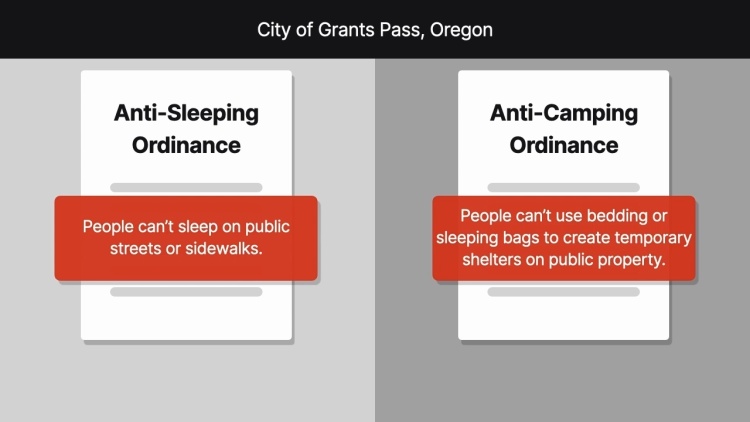Johnson v. City of Grants Pass
United States Court of Appeals for the Ninth Circuit
50 F.4th 787, No. 20-35752 (2022)
- Written by Liz Nakamura, JD
Facts
[Editor’s Note: This brief summarizes the amicus curiae brief filed by the University of Miami School of Law. This is not a brief for the Ninth Circuit’s opinion. The facts included below are limited to those necessary to contextualize the amicus curiae brief.] The City of Grants Pass, Oregon (Grants Pass) (defendant) had more homeless individuals than it had shelter beds. Therefore, many homeless individuals had no choice but to sleep in Grants Pass’s parks or on its streets. Grants Pass passed several antihomeless ordinances, including criminalizing the outdoor use of blankets, pillows, or other forms of camping materials within city limits. A violation was punishable with a civil fine. Multiple fines would result in the homeless individual being banned from the city limits, and any homeless individual found within the city limits after receiving an exclusion order would face criminal charges. Three involuntarily homeless individuals (plaintiffs) sued Grants Pass, arguing that the antihomeless ordinances violated the Eighth Amendment’s prohibition against cruel and unusual punishments. The district court agreed and granted a permanent injunction against several ordinances; however, the district did permit the continued enforcement of ordinances specifically designed to prevent the establishment of homeless encampments, such as the prohibition against the erection of tents in public parks. Grants Pass appealed.
Rule of Law
Issue
Holding and Reasoning (University of Miami School of Law)
What to do next…
Here's why 900,000 law students have relied on our case briefs:
- Written by law professors and practitioners, not other law students. 47,000 briefs, keyed to 994 casebooks. Top-notch customer support.
- The right amount of information, includes the facts, issues, rule of law, holding and reasoning, and any concurrences and dissents.
- Access in your classes, works on your mobile and tablet. Massive library of related video lessons and high quality multiple-choice questions.
- Easy to use, uniform format for every case brief. Written in plain English, not in legalese. Our briefs summarize and simplify; they don’t just repeat the court’s language.





